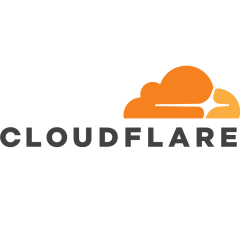What is our primary use case?
I use Cloudflare for legacy websites that I need to protect because they're very vulnerable or to secure a client's critical websites. We will implement it after a review or if the website has gotten a poor grade on one of those online checks to see if the security meets the minimum requirements.
Usually, after I show them their website is vulnerable, I get them to sign up immediately. For me, it's more of a delta suspender as a security measure. I find that many web developers do a poor job of updating their websites and keeping all the security modules.
Cloudflare has a server, and you point your DNS there. From there, you either enable the passthrough or use their full proxy. When you use their full proxy, you get all the features. If you're only doing the DNS, it's just a basic DNS server. Most people don't use it just for DNS; they use it for proxying their websites. You can proxy other services as well, but I've only used it for web applications on different ports.
What is most valuable?
Many websites require an SSL certificate because they sell stuff and want SSL. Cloudflare comes with an SSL certificate built in. It's automatic. You sign yourself up for Cloudflare, and an SSL certificate automatically protects your website. If you have a connection between your website and your host, the server, Cloudflare, and the host, you don't necessarily need a certificate, okay?
What needs improvement?
It should be easier to collect the logs with companies like Sumo. However, based on my discussions with the salespeople, I understand that's how they make their money. With the enterprise product, they want people doing those kinds of enterprise features to do the logging. They want them to pay a lot of money, and that's where I have an issue with them. That should be a default. You should be able to get the log no matter what. The logging should be universal.
For how long have I used the solution?
I have been using Cloudflare for several years.
What do I think about the stability of the solution?
Cloudflare is highly stable.
What do I think about the scalability of the solution?
Cloudflare is highly scalable. Cloudflare is a system with a web portal that the end users like me see. It's a console where we can adjust the DNS, caching, and security features all in that console. Cloudflare owns thousands of servers across the world that cache the data. It's a powerful solution. When clients sign up for Cloudflare, they're getting this monster content delivery network, security, and a web application firewall in one. It's all rolled into one, and it's massive.
Unless you have your website hosted on a massive hosting provider, there's no way that you can deliver the amount of data that Cloudflare can provide to the end users. If you have static content, there's no way that you can ever match what Cloudflare can do. Obviously, there are competitors to Cloudflare that do the same, but I'm saying other types of solutions.
Let's say you go with F5. Great, that's on-prem. That's in your colo. You can't deliver as much data to the internet as you can with a CDN. You don't have to spend $20,000 on a net scaler, F5, or whatever Cisco's selling now. You don't have to buy that. You pay them $50 a month or $150 a month. It's totally worth it because even in five years, you'll never get the performance value, not just the actual ROI. You have to consider how much throughput you can get with Cloudflare.
How are customer service and support?
It depends on the level of support. Basic Cloudflare support is average. Enterprise support is amazing. It's 10 out of 10. However, if you're paying $20, you get email-based support.
How was the initial setup?
Cloudflare is effortless to set up because you point the DNS to it, and it's working. You enable the proxy and SSL. The website is protected within 10 or 15 minutes. The biggest wait is for the internet to see that the DNS has changed. I always do the initial setup myself and then give it to one of my web guys to manage. There's a reason behind I do it that way. When ordering a client, I generally manage their DNS, email, and other services. I don't want to let the web developer mess it up.
The web developers know how to do it but don't have a stake in it like I do. If they flip a switch and forget to update the FPF or TXT records, and other essential documents start to break, it's a problem. I don't trust them to do the setup. Other than that, I let them have access. I let the web developers have access because they need to make changes. They're going to add host entries, etc., and they may want to adjust some of the features in Cloudflare.
I'm not a web expert. I have expertise in infrastructure, server planning, and SQL. I can support the whole picture, but I'm not a web expert. You don't need a web expert to do it. You can get a generalist like me, and I have many specific skills. However, I don't do that every day, and you don't have to touch it daily. In a lot of ways, it's a set-it-and-forget-it kind of deal.
The solution requires some primary care and feeding for performance problems and functionality issues, like if something doesn't work because it's a bad link. I engage with the web developer to determine if it's a problem with caching, the code, filter configuration, etc. We look at all the different features. That may require some effort. However, if you don't make any changes to the website, you might only touch it twice a year after it's configured.
What was our ROI?
I have some clients whose sites don't do anything. It's like a virtual business card. For those sites, I give them the lowest common denominator of Cloudflare set up for that domain. The website is protected and much less likely to get hacked.
However, if I have a company that has online sales and sends out many newsletters, then they need to have a CDN. That way, if a thousand people get that email and click it at once, it will not kill their server. That's the value of having Cloudflare or something similar. It's different if a thousand people click on a server farm in one location.
Even at AWS, you have to have this auto-scaling, and the configuration is significant. I would get paid thousands of dollars to set that up. That costs a fortune in monthly payments. I don't know of any of these different companies that host servers. I just put the website on Cloudflare, and they don't spend much money on my time. Maybe I should be smarter and push the AWS, so I get paid more.
What's my experience with pricing, setup cost, and licensing?
It could range from free to $1,500 a month. I put all my clients on Cloudflare, so it's around 20 or 30 customers. One of my clients has more than two dozen domains on Cloudflare, so they pay $20 times 20 domains. He's paying $400 a month. It isn't cheap, but it's totally worth it.
What other advice do I have?
I rate CloudFlare 10 out of 10. I couldn't recommend it more strongly. If you have a website, you need to use Cloudflare or something like it. Don't leave your website unprotected. That's my advice. I set up Cloudflare for every client that wants to host a website because it protects their site and makes it easier for me to manage the DNS.
I get them to pay the $20 for it. That's the bare minimum. If you want something that can enhance the security of your website, just do Cloudflare. I always do it. I mean, I'm always going to add to my Cloudflare base. I'm never going to shrink unless I find something better. But I don't know of any other solutions that.
You can do a self-sign. That's a couple hundred dollars a year that you don't have to spend, and you don't have to manage that. You can lock down your security on your website so that only the Cloudflare data centers can access your web server. You're limiting a lot of risks.
Let's say you're hosting your site on GoDaddy. GoDaddy's server is unprotected. It's just a server out there. They have enterprise IDS and all that other stuff, but for the most part, they're vulnerable. People attack them all the time. You can limit that by only allowing access to your website from Cloudflare servers. Cloudflare stands in front of your servers as a firewall. That increases performance and security. It limits a lot of access to your servers.
There are so many benefits here. You don't need SSL on your site, which is excellent, because you don't have to pay for that certificate. That makes it a lot easier. Troubleshooting your site for problems and not having SSL enabled between you and Cloudflare is huge.
Disclosure: My company does not have a business relationship with this vendor other than being a customer.























